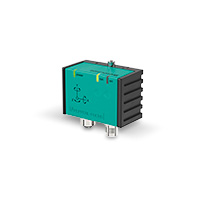A Sensor for Multiple Tasks in Wind Turbines
Inertial Measurement Unit F99 Provides Data for Maximum Efficiency and Plant Protection

The Application
Numerous sensors monitor wind turbines to ensure safe and efficient operation. For example, these sensors monitor tower vibration, the position and rotational speed of the hub, and the torsion and icing of the blades. Excessive ice formation triggers a maintenance operation to prevent large chunks of ice from falling. In addition, icing has an effect on the efficiency of the plant, because the blades vibrate and some of the wind power is lost.
The Goal
The sensor technology is designed to reliably provide data with which the hub can be optimally aligned and critical conditions can be prevented. Accurate real-time data is required to avoid excessive tower vibration. The rotation speed and position of the hub must be accurately recorded to optimally align the hub, maintain the maximum permissible rotation speed, and lower the speed if necessary. The acceleration of the blades must be monitored to detect unavoidable icing or a deformation of the blades, and to be able to plan the servicing of the plant. The devices used must provide reliable data even under extreme temperatures and harsh ambient conditions.
The Solution

IMU F99
The inertial measurement unit F99 can perform all the above mentioned tasks and meets the special requirements for operating in wind turbines: mounted on the nacelle, it reliably measures tower vibration based on the acceleration values. At the hub, it measures the rotation rate and angle, therefore capturing both the speed and the orientation. In turn, in the individual rotor blades, the devices measure the vibration behavior based on the acceleration values. Excessive vibration indicates ice formation or too much torsion.
Technical Features
- Inclination, acceleration, and rotation rate measurement along three axes
- Adjustable compensation range
- Noncontact and maintenance-free measurement
- Degree of protection: IP68/IP69K
- Temperature range of –40 °C to +85 °C
- Housing withstands mechanical impact up to 100 g
- Interface for parameterization
- Output formats and values can be selected
- Suitable for dynamic applications
The Benefits
The same device type completes various tasks, therefore reducing the expenditure in asset management—the inertial measurement unit F99 can replace several other sensor types. Measurement is noncontact and requires no target. Since no ball bearing is required, the device is maintenancefree. It has been developed for outdoor use, especially offshore. The sensor features IP68/IP69K degree of protection and has been tested in salt spray in accordance with IEC 60068-2-52.
At a Glance
- One type of sensor for a range of tasks simplifies asset management
- Noncontact measurement of inclination, acceleration, and rotation rate along three axes
- Rugged design for outdoor use in harsh conditions including offshore
- Resistant to dust, dirt, moisture, salt spray, and extreme temperatures
- Adjustable compensation range for adjusting angular accuracy








 +1 330 425-3555
+1 330 425-3555